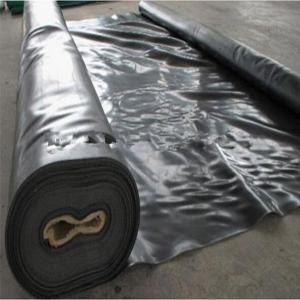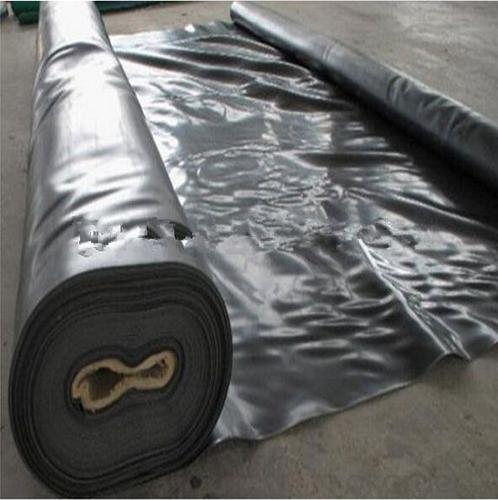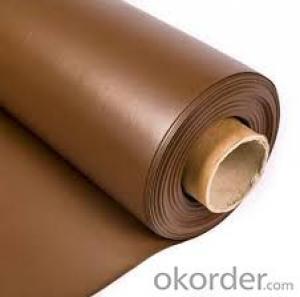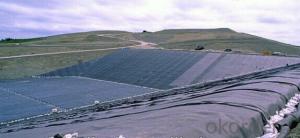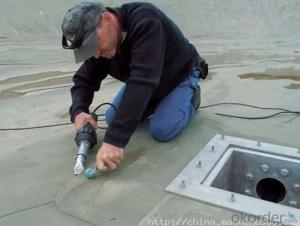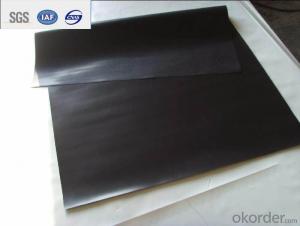1.0mm/1.2mm/1.5mm EPDM Rubber Roofing Waterproof Membrane
- Loading Port:
- Shanghai
- Payment Terms:
- TT OR LC
- Min Order Qty:
- 1000 m²
- Supply Capability:
- 100000 m²/month
OKorder Service Pledge
OKorder Financial Service
You Might Also Like
Product description
ROOF WATERPROOF SYSTEM-
EPDM MEMBRANE/COIL is made from ternary ethylene-propylene rubber. With the best performance among high polymer waterproof materials, EPDM is of exceptional elasticity and will not split or crack under normal building movement.
Application Scope
• Roofs, Basement, Toilet
•Industrial and civil building waterproofing
•Geo-synthetic liner for swimming pool, channels, irrigation system
•Especially suit for projects with high requirements in durability, anti-corrosion and deformation
Advantagee
•Excellent weather-ability, durability and size stability
•Good adaptability to high and low temperature, UV resistant and anti-corrosion
•High tensile strength and good elongation, accommodating to structure movement
•Easy installation, solid joint, and no environmental pollution
•Good rooting penetration resistance
•Service life up to 50 years
Storage:
Shelf life is 12 months. Store in a cool and dry place with
original packing.
5,Demension:
1.2mmx1.2mx20m;1.5mmx1.2mx20m;2.0mmx1.2mx20m
Advantages

Technical Parameters
| Item | Index | ||||||
| 1 | Thickness of resin layer of the middle fabric ,mm≥ | - | - | 0.40 | 0.40 | 0.40 | |
| 2 | Tensile performance | Max tensile strength,N/cm ≥ | - | 120 | 250 | - | 120 |
| Tensile strength,NPa ≥ | 10 | - | -10 | - | - | ||
| Max elongation% ≥ | - | - | 15 | - | - | ||
| Breaking elongation % ≥ | 200 | 150 | - | 200 | 100 | ||
| 3 | Heat treatment size change rate%≤ | 2.0 | 1.0 | 0.5 | 0.1 | 0.1 | |
| 4 | Cold bonding | -25°c No cracks | |||||
| 5 | Watertightness | 0.3mPa,2h waterproof | |||||
Packaging & Shipping
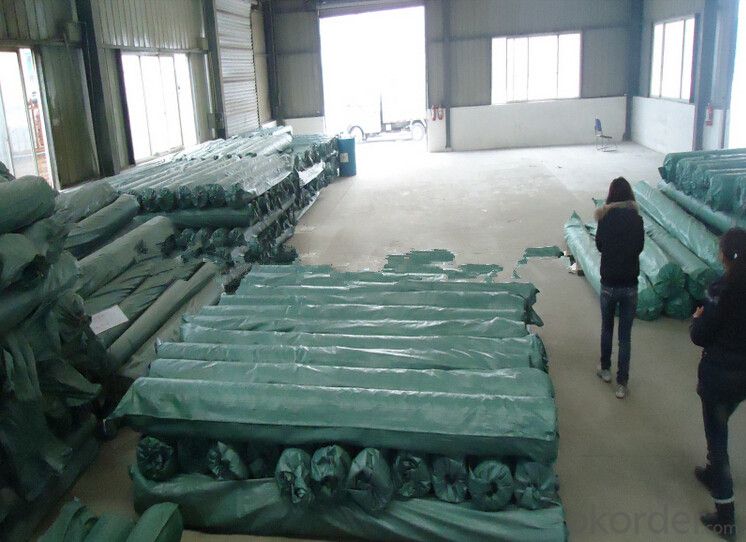
Our service
1.sample: the sample is free ,you only should pay for the freight.
2.If you order to us ,we must promise the quality ,if some quality problem happened,
1)We will dispatch our Quality and Problems Appraisers to make a confirmation
2) Have a negotiation of the compensation and sign agreements
3) Our After-Sales Department will perform the duties as the agreements.
product show
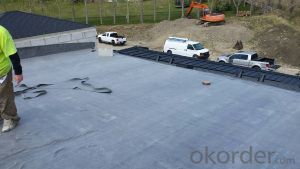
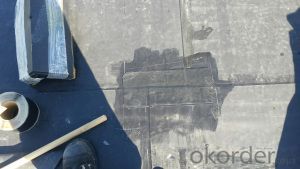
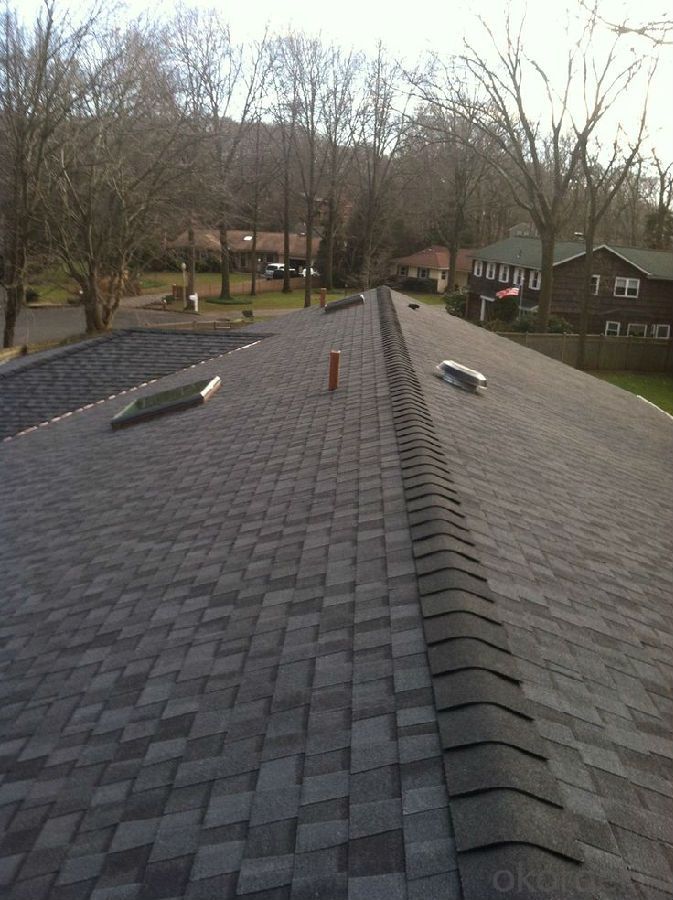
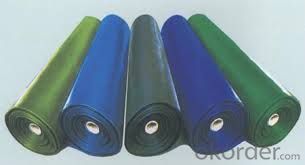
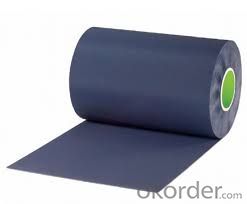
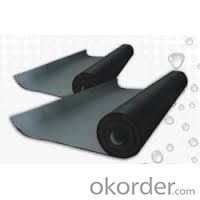
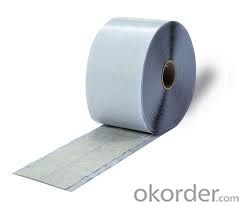
factory show
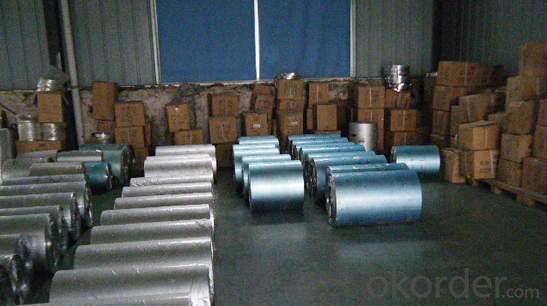
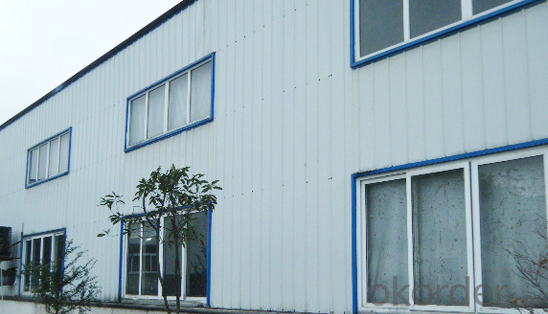
FAQ
Q: What's the de6abf1fe186f8d58506cbcfe46eed814d.jpglivery time ?
A: 3-5 days for 1-600 rolls, 10-15 days for container.
Q: What's the payment terms ?
A: TT/LC
Q: How do you make replacement with quality problems ?
A: New replacement will be packed into your next order or send to you directly after receive video or photo about quality problems.
- Q: Can a waterproofing membrane be pre-fabricated or pre-made for easy installation?
- Yes, a waterproofing membrane can be pre-fabricated or pre-made for easy installation. Pre-fabricated membranes are manufactured in controlled environments, allowing for consistent quality and performance. They are designed to be installed quickly and easily, reducing labor time and cost. Pre-made membranes also ensure a precise fit and minimize the risk of installation errors. Overall, pre-fabricated or pre-made waterproofing membranes offer convenience and efficiency in the installation process.
- Q: Can a waterproofing membrane be used for laboratories or research centers?
- Yes, a waterproofing membrane can be used for laboratories or research centers. Waterproofing membranes are effective in preventing water infiltration and can help protect sensitive equipment, materials, and experiments from water damage. They can be applied to various surfaces such as floors, walls, and roofs to create a watertight barrier, ensuring a safe and dry environment for laboratory and research activities.
- Q: Can a waterproofing membrane be applied on both horizontal and vertical surfaces?
- Waterproofing membranes can be utilized on surfaces that are both horizontal and vertical. These membranes are designed to form a barrier that prevents water from penetrating and causing harm to said surfaces. They find common use in various areas such as roofs, basements, bathrooms, and swimming pools. Whether it be a floor or a wall, the waterproofing membrane can be applied to safeguard against water infiltration. The application process may differ depending on the specific surface, but there are membranes readily available that can be easily applied to both horizontal and vertical surfaces. To guarantee proper installation and effectiveness of the waterproofing membrane, it is vital to adhere to the manufacturer's instructions and seek guidance from professionals.
- Q: Can a waterproofing membrane be used on tunnels with historical significance?
- Yes, a waterproofing membrane can be used on tunnels with historical significance. The membrane can help protect the tunnel from water damage and prevent further deterioration, ensuring the preservation of its historical significance.
- Q: Can a waterproofing membrane be used in conjunction with paint or coatings?
- Using a waterproofing membrane alongside paint or coatings is a widely practiced technique in construction and renovation projects. This combination offers a dual-layer protection system, providing a barrier against moisture and preventing water infiltration. Additionally, the paint or coatings enhance the visual appeal and can offer extra defense against UV rays, weathering, and chemical exposure. To ensure the best outcome, it is crucial to confirm compatibility between the waterproofing membrane and the paint or coatings to avoid any negative reactions or loss of effectiveness. Seeking guidance from professionals or consulting the manufacturer's guidelines will help determine the most suitable combination and application process for your particular project.
- Q: Can a waterproofing membrane be used for a balcony deck?
- Indeed, a balcony deck can be protected by utilizing a waterproofing membrane. It is a highly recommended solution for shielding balcony decks against water damage. The primary purpose of a waterproofing membrane is to establish a barrier that hinders the infiltration of water into the underlying structure. It effectively safeguards the deck from various moisture-related problems such as rot, mold, and deterioration. This membrane is typically applied in either liquid or sheet form, effectively covering the entire surface of the balcony deck to create a seamless and impenetrable layer. Acting as a shield, this membrane ensures that any water coming into contact with the deck is effectively repelled and diverted away. By incorporating a waterproofing membrane, you can successfully prolong the lifespan of your balcony deck and uphold its structural integrity for many years to come.
- Q: Can waterproofing membranes be used in basements?
- Basements can indeed benefit from the use of waterproofing membranes. These specialized membranes are designed specifically to act as a barrier against water penetration and are commonly employed in basements to effectively prevent moisture and water seepage. Typically composed of materials like rubber, bitumen, or polyethylene, these membranes are carefully applied to the walls and floors of the basement, creating an impermeable seal that keeps water out. By effectively stopping water from entering the basement, these membranes play a crucial role in safeguarding the foundation, walls, and interior spaces from the damaging effects of water, including mold and other moisture-related problems. Moreover, for comprehensive protection against water infiltration, waterproofing membranes can be utilized in conjunction with other waterproofing techniques like drainage systems and sump pumps.
- Q: How does a waterproofing membrane handle exposure to high temperatures?
- A waterproofing membrane is designed to withstand exposure to high temperatures. It is typically made from durable materials such as bitumen, EPDM (ethylene propylene diene monomer), or PVC (polyvinyl chloride) that have high melting points and can resist heat. These materials have been specifically chosen to ensure that the waterproofing membrane does not degrade or lose its effectiveness when exposed to high temperatures. The membrane's ability to handle high temperatures is dependent on its composition and quality. High-quality waterproofing membranes are manufactured with additives and fillers that enhance their resistance to heat. These additives help the membrane maintain its integrity and prevent it from softening, melting, or becoming brittle when exposed to elevated temperatures. Furthermore, the installation process of the waterproofing membrane also plays a crucial role in its ability to handle high temperatures. Proper installation techniques, such as ensuring proper adhesion and seam sealing, are essential to maintain the membrane's effectiveness and prevent any potential damage caused by heat exposure. In summary, a waterproofing membrane is specifically designed to handle exposure to high temperatures. Its composition, quality, and installation techniques all contribute to its ability to withstand heat without degrading or losing its waterproofing properties.
- Q: Can waterproofing membranes be used on outdoor fountains?
- Indeed, outdoor fountains can benefit from the application of waterproofing membranes. The primary purpose of these membranes is to establish a protective shield that thwarts water infiltration, rendering them an excellent choice for safeguarding outdoor fountains against water-induced harm. Typically composed of water-resistant materials like rubber, PVC, or bitumen, these membranes effectively seal the fountain's structure. By applying a waterproofing membrane to an outdoor fountain, one can extend its longevity, avert leaks, and shield it from the elements.
- Q: Can a waterproofing membrane be used in temporary or temporary structures?
- Indeed, temporary or transient structures can benefit from the utilization of a waterproofing membrane. These specialized membranes are crafted to establish a safeguard against the infiltration of water, a critical measure in thwarting any potential moisture-related harm in various architectural formations. Be it a fixed or impermanent construction, such as a provisional refuge, tent, or temporary worksite, the application of a waterproofing membrane guarantees the attainment of water resistance and protection. Consequently, it becomes imperative to meticulously select a waterproofing membrane that aligns with the distinct requisites of the temporary structure, while adhering to the appropriate installation protocols to ensure its utmost efficacy.
Send your message to us
1.0mm/1.2mm/1.5mm EPDM Rubber Roofing Waterproof Membrane
- Loading Port:
- Shanghai
- Payment Terms:
- TT OR LC
- Min Order Qty:
- 1000 m²
- Supply Capability:
- 100000 m²/month
OKorder Service Pledge
OKorder Financial Service
Similar products
Hot products
Hot Searches
Related keywords
